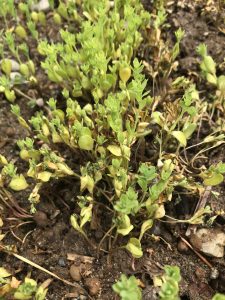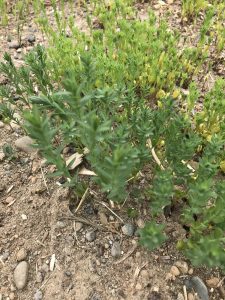Today while going to check on my flax, I noticed that a good portion of the crop was yellowing at the base and some even looked a bit burned. With the hot weather we’ve been having, it’s not super surprising that they would be needing some extra help in regards to water.

After watering, I consulted with Dave about the health of the plants and he pointed out that they are not flopping over in the way that under-watered plants do. This led him to believe that it could perhaps be a nutrient deficiency instead. Either of these potential issues are a not what I expected to encounter with flax given the information I had been reading about it. All of my sources have stated that flax is a light feed and usually does not require watering after germinating. But, things happen and unexpected weather can definitely have an unforeseen impact on even the most predictable of crops. So, I set about seeing how to ensure that my crops are as healthy as possible with some help from the wonderful Organic Farm staff.

After further discussion with Dave, I set about applying a foliar spray to the leaves in order to get an idea of whether or not the yellowing is truly due to nutrient deficiency. The yellowing at the base of the plant indicates that it is probably either nitrogen or sulphur, so, kelp spray seemed to be the easiest solution. Kelp meal is made from seaweed which contains N, P, and K nutrients. It also contains growth hormones such as auxins and cytokinins that can help counter the stunted growth that occurs after a nutrient deficiency.
In order to fertilize my 5’x10′ bed, I applied 4 tbs of kelp meal to a gallon of water and loaded it into the backpack sprayer. I was able to spray the whole bed two times over with the liquid kelp. Foliar sprays tend to be pretty fast acting, so hopefully I will see some results within the next couple of days. If the plants react well to the spray, then I will know that it was, in fact, likely a nitrogen deficiency and I can begin working out a fertilizing plan to make sure that the flax continues to grow at a healthy pace. Results to follow!